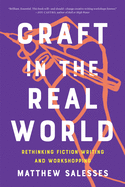
"Why do we believe there is any such thing as 'pure craft'?" writes novelist Matthew Salesses. "When writers identify race and gender and sexuality, etc., as central concerns of writing, it isn't because they have nothing to say about pacing or space breaks. They are doing the hard work other writers avoid, in order to shed light on the nature of craft itself."
Salesses shows that one can teach the finer points of writing by using them to call attention to what is left unsaid: questions about one's positions and biases, acknowledging difference over valuing similarities, and the ability to read between the lines. In fact, in this text, Salesses suggests that many cardinal rules of fiction writing are shorthand for encoded cultural and historical patterns. He deftly challenges writers to examine problems of identity to strengthen their writing, rather than turn away from them.
While the author concentrates on the act of writing, there is much in this book to challenge readers to question more deeply how they read. Essentially, Craft in the Real World offers a reorientation of how to write well by being aware of the many layered expectations of who might be reading a book after it is written, because "craft tells us how to see the world," and Salesses is asking writers and workshop participants to be more aware of the many ways to see the world. He does this by offering concrete examples of new and different ways "the workshop" might be approached, and exercises to accompany such workshops.
Salesses (Disappear Doppelgänger Disappear) presents a timely, forceful examination of the notion of craft, and how the idea of neutrality, or "pure craft," as it exists in many writing workshops, can be deconstructed to challenge biases that have often made the publishing world inaccessible to people of various marginalized backgrounds. --Michelle Anya Anjirbag, freelance reviewer

